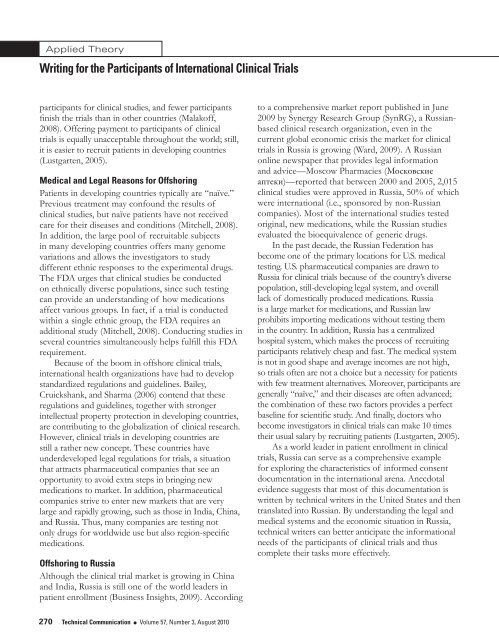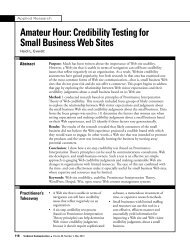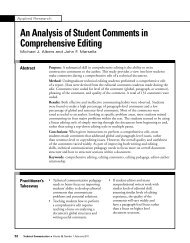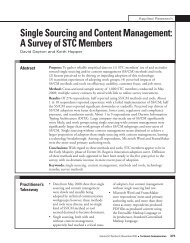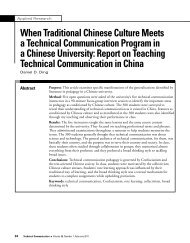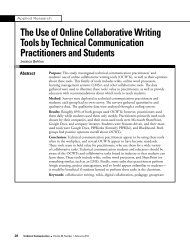Applied TheoryWriting for the Participants of International Clinical Trialsparticipants for clinical studies, and fewer participantsfinish the trials than in other countries (Malakoff,2008). Offering payment to participants of clinicaltrials is equally unacceptable throughout the world; still,it is easier to recruit patients in developing countries(Lustgarten, 2005).Medical and Legal Reasons for OffshoringPatients in developing countries typically are “naïve.”Previous treatment may confound the results ofclinical studies, but naïve patients have not receivedcare for their diseases and conditions (Mitchell, 2008).In addition, the large pool of recruitable subjectsin many developing countries offers many genomevariations and allows the investigators to studydifferent ethnic responses to the experimental drugs.The FDA urges that clinical studies be conductedon ethnically diverse populations, since such testingcan provide an understanding of how medicationsaffect various groups. In fact, if a trial is conductedwithin a single ethnic group, the FDA requires anadditional study (Mitchell, 2008). Conducting studies inseveral countries simultaneously helps fulfill this FDArequirement.Because of the boom in offshore clinical trials,international health organizations have had to developstandardized regulations and guidelines. Bailey,Cruickshank, and Sharma (2006) contend that theseregulations and guidelines, together with strongerintellectual property protection in developing countries,are contributing to the globalization of clinical research.However, clinical trials in developing countries arestill a rather new concept. These countries haveunderdeveloped legal regulations for trials, a situationthat attracts pharmaceutical companies that see anopportunity to avoid extra steps in bringing newmedications to market. In addition, pharmaceuticalcompanies strive to enter new markets that are verylarge and rapidly growing, such as those in India, China,and Russia. Thus, many companies are testing notonly drugs for worldwide use but also region-specificmedications.Offshoring to RussiaAlthough the clinical trial market is growing in Chinaand India, Russia is still one of the world leaders inpatient enrollment (Business Insights, 2009). Accordingto a comprehensive market report published in June2009 by Synergy Research Group (SynRG), a Russianbasedclinical research organization, even in thecurrent global economic crisis the market for clinicaltrials in Russia is growing (Ward, 2009). A Russianonline newspaper that provides legal informationand advice—Moscow Pharmacies (Московскиеаптеки)—reported that between 2000 and 2005, 2,015clinical studies were approved in Russia, 50% of whichwere international (i.e., sponsored by non-Russiancompanies). Most of the international studies testedoriginal, new medications, while the Russian studiesevaluated the bioequivalence of generic drugs.In the past decade, the Russian Federation hasbecome one of the primary locations for U.S. medicaltesting. U.S. pharmaceutical companies are drawn toRussia for clinical trials because of the country’s diversepopulation, still-developing legal system, and overalllack of domestically produced medications. Russiais a large market for medications, and Russian lawprohibits importing medications without testing themin the country. In addition, Russia has a centralizedhospital system, which makes the process of recruitingparticipants relatively cheap and fast. The medical systemis not in good shape and average incomes are not high,so trials often are not a choice but a necessity for patientswith few treatment alternatives. Moreover, participants aregenerally “naïve,” and their diseases are often advanced;the combination of these two factors provides a perfectbaseline for scientific study. And finally, doctors whobecome investigators in clinical trials can make 10 timestheir usual salary by recruiting patients (Lustgarten, 2005).As a world leader in patient enrollment in clinicaltrials, Russia can serve as a comprehensive examplefor exploring the characteristics of informed consentdocumentation in the international arena. Anecdotalevidence suggests that most of this documentation iswritten by technical writers in the United States and thentranslated into Russian. By understanding the legal andmedical systems and the economic situation in Russia,technical writers can better anticipate the informationalneeds of the participants of clinical trials and thuscomplete their tasks more effectively.270 Technical Communication l Volume 57, Number 3, August 2010
Applied TheoryTatiana BatovaThe United States and Russia: The Impactof Legal and Cultural Differences onInformed Consent DocumentsThe benefits of offshoring clinical trials are evident,but critics wonder if, in the rush for savings,pharmaceutical companies fail to consider the ethicalpitfalls (e.g., Normile, 2008). Bioethicists point outthat the rights of participants in international studiesare often trampled, because people in other countriesrespond differently to informed consent proceduresand documents (Moodley, Pather, & Myer, 2005).In addition, some guidelines in the internationalstandardization regulations leave much open tointerpretation, which allows the companies to takeadvantage of the participants. For example, the ICH-GCP requirement for sponsors to make sure thatclinical trials are “adequately monitored” can only beeffective if it is effectively implemented (Glickmanet al., 2009). Some U.S. laws governing clinical trialscontradict international laws; this affects clinicalstudies in Russia, as Russia is still developing its owncode for medical research and, in the meantime,abides by international standards. Moreover, both theU.S. and international legal systems can be in conflictwith the contexts of people’s lives and their culturallydetermined mindsets. The following examples illustratehow legal differences and cultural contradictions affectinformed consent documentation to the detriment ofparticipants of clinical trials.International Legal Debate: The Use of PlaceboInternational regulation and standardization attemptshave often run into trouble because new directivesare in conflict with the laws of a specific country.For example, regulations of the U.S.-based FDAcontradict some of the international guidelines of theWorld Medical Association (WMA). The Declarationof Helsinki—the best-known policy statementof WMA regarding clinical trials—was amendedin 2000–2002 on three major issues: limitation ofplacebo use, stronger requirement for trial sponsorsto provide medical care to participants after the studyis finished, and public registration of clinical trialsbefore recruiting the first subject (Normile & Marshall,2008). In October 2008, the FDA—which previouslyreferenced the Helsinki Declaration as the basis forclinical trial regulation—amended its requirements. Toavoid inconsistency, the FDA now accepts results ofclinical trials from overseas if they do not comply withthe Helsinki Declaration but rather with the ICH-GCP(Fiscus, 2009).As a result, critics say that the FDA requirementsare now less demanding in the protection of humanrights of participants. According to Stuart Rennie, abioethicist at the University of North Carolina, thisdecision by the FDA does not stand up to scrutiny sinceit “would seem to encourage pharmaceutical companiesto cut ethical corners when working abroad. … TheGCP is more open to the use of placebos and does notmention conflicts of interest, the need to publish results,or post-trial access to care” (Normile & Marshall, 2008,p. 516).Many U.S. informed consent documents are createdand sent to foreign countries without addressing thisconflict. In my translation work with informed consentdocuments, I often encountered sentences such asthese two [emphasis added]: “There is an agreementbetween health care experts and regulatory authoritiesthat in order to obtain reliable and valid results ofmedication efficacy placebo-controlled studies are necessary”and “Regulatory authorities such as the FDA (Foodand Drug Administration) and the EMEA (EuropeanMedicine Evaluation Agency) can only grant approvalfor medications if their efficacy has been proven to beunambiguous, which means superior to placebo.”Such statements can be hard to decipher for anEnglish-speaking patient because of their jargon, andthey could become utterly confusing in an internationalsetting, as well as provide grounds for litigation. Thetwo sentences assume that all health care experts andall regulatory authorities agree on using a placebo;they imply that the only way to prove unambiguousefficacy of a drug is to compare it with placebos.However, many experts and regulatory agencies (e.g.,WMA) consider the use of a placebo necessary onlyif no known medication exists for a particular disease.Comparing the experimental medication with an existingdrug can provide conclusive results. Thus, treatingparticipants with placebos in a blind study (a study inwhich participants do not know whether they are takinga placebo, an experimental drug, or a patented drug)when they could be treated with a patented medicationVolume 57, Number 3, August 2010 l Technical Communication 271
- Page 1 and 2: AUGUST 2010Volume 57 Number 3SPECIA
- Page 3 and 4: PresidentMichael A. HughesVice Pres
- Page 5 and 6: VoLuME 57, NuMBER 3AUGUST 2010ISSN
- Page 7 and 8: Guest EditorialKirk St.Amant and Ma
- Page 9 and 10: Applied ResearchTechnical Communica
- Page 11 and 12: Applied ResearchNicole St. Germaine
- Page 13 and 14: Applied ResearchNicole St. Germaine
- Page 15 and 16: Applied ResearchNicole St. Germaine
- Page 17 and 18: Applied ResearchNicole St. Germaine
- Page 19 and 20: Applied ResearchNicole St. Germaine
- Page 21 and 22: Applied ResearchNicole St. Germaine
- Page 23 and 24: Applied ResearchNicole St. Germaine
- Page 25 and 26: Applied TheoryTatiana BatovaIntrodu
- Page 27: Applied TheoryTatiana BatovaMoreno,
- Page 31 and 32: Applied TheoryTatiana Batovadoctors
- Page 33 and 34: Applied TheoryTatiana BatovaTo addr
- Page 35 and 36: Applied TheoryTatiana Batovathe loc
- Page 37 and 38: Applied TheoryTatiana BatovaJohnson
- Page 39 and 40: Applied TheoryTatiana BatovaInterna
- Page 41 and 42: Applied TheoryMcKee and PorterIntro
- Page 43 and 44: Applied TheoryMcKee and PorterFor e
- Page 45 and 46: Applied TheoryMcKee and Porterpubli
- Page 47 and 48: Applied TheoryMcKee and PorterBecau
- Page 49 and 50: Applied TheoryMcKee and Porterof th
- Page 51 and 52: Applied TheoryMcKee and Porterwith
- Page 53 and 54: Applied TheoryMcKee and PorterA Cop
- Page 55 and 56: Applied TheoryMcKee and PorterConte
- Page 57 and 58: Applied TheoryMcKee and PorterWalto
- Page 59 and 60: Applied ResearchLiza PottsIntroduct
- Page 61 and 62: Applied ResearchLiza Pottsdoes not
- Page 63 and 64: Applied ResearchLiza PottsUser’s
- Page 65 and 66: Applied ResearchLiza Pottsactors, t
- Page 67 and 68: Applied ResearchLiza PottsDRM has a
- Page 69 and 70: Applied ResearchLiza Pottsmake bett
- Page 71 and 72: Applied ResearchLiza PottsOne viewe
- Page 73 and 74: Applied ResearchLiza Pottsinvolved
- Page 75 and 76: Applied ResearchLiza PottsHayhoe, G
- Page 77 and 78: Applied ResearchInternational Fair
- Page 79 and 80:
Applied ResearchTyAnna K. Herringto
- Page 81 and 82:
Applied ResearchTyAnna K. Herringto
- Page 83 and 84:
Applied ResearchTyAnna K. Herringto
- Page 85 and 86:
Applied ResearchTyAnna K. Herringto
- Page 87 and 88:
Applied ResearchTyAnna K. Herringto
- Page 89 and 90:
Book ReviewsWriting Successful Scie
- Page 91 and 92:
Book ReviewsThe Process: Business P
- Page 93 and 94:
Book ReviewsHCI Beyond the GUI: Des
- Page 95 and 96:
Book ReviewsOrigins of the Specious
- Page 97 and 98:
Book Reviewsgenre, and process, top
- Page 99 and 100:
Book ReviewsPart One goes from the
- Page 101 and 102:
Book Reviewsrather than writers, an
- Page 103 and 104:
Book ReviewsHow to Write Fast Under
- Page 105 and 106:
Book Reviewsmanagement system (CMS)
- Page 107 and 108:
Book Reviewsnearly strangled when h
- Page 109 and 110:
Book Reviewsinteractive TV model)
- Page 111 and 112:
Book ReviewsOtherwise, Beech shows
- Page 113 and 114:
Book Reviewssuch as blog, I found m
- Page 115 and 116:
Book Reviewsemployees and effective
- Page 117 and 118:
Recent & RelevantSherry Southard, E
- Page 119 and 120:
Recent & RelevantRecent & RelevantC
- Page 121 and 122:
Recent & RelevantRecent & RelevantE
- Page 123 and 124:
Recent & Relevantworking in a langu
- Page 125 and 126:
Recent & RelevantWhat’s the big d
- Page 127 and 128:
Recent & RelevantScientific Writing
- Page 129 and 130:
Recent & Relevantapplicability. Man
- Page 131:
Did You Missthe Summit?Don’t miss


